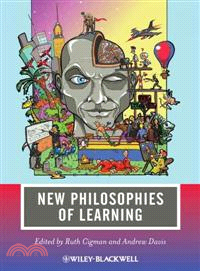New Philosophies Of Learning
商品資訊
系列名:Journal of Philosophy of Education
ISBN13:9781405195645
出版社:John Wiley & Sons Inc
作者:Cigman
出版日:2009/05/28
裝訂/頁數:平裝/352頁
規格:22.2cm*15.2cm*1.9cm (高/寬/厚)
商品簡介
作者簡介
目次
相關商品
商品簡介
Through a collection of contributions from an international team of empirical researchers and philosophers, New Philosophies of Learning signals the need for a sharper critical awareness of the possibilities and problems that the recent spate of innovative learning techniques presents.
Explores some of the many contemporary innovations in approaches to learning, including neuroscience and the focus on learners’ well-being and happiness
Debates the controversial approaches to categorising learners such as dyslexia
Raises doubts about the preoccupation with quasi-mathematical scrutiny and the neglect of ethical reflection about education
Discusses the possible grounds for concern, without exaggerating their similarities or offering sweeping judgements
Includes contributions from empirical researchers and philosophers, including Usha Goswami, Howard Gardner, Julian Elliott, David Bakhurst, John White and Christopher Winch
Explores some of the many contemporary innovations in approaches to learning, including neuroscience and the focus on learners’ well-being and happiness
Debates the controversial approaches to categorising learners such as dyslexia
Raises doubts about the preoccupation with quasi-mathematical scrutiny and the neglect of ethical reflection about education
Discusses the possible grounds for concern, without exaggerating their similarities or offering sweeping judgements
Includes contributions from empirical researchers and philosophers, including Usha Goswami, Howard Gardner, Julian Elliott, David Bakhurst, John White and Christopher Winch
作者簡介
Ruth Cigman did her PhD in Philosophy of Music at Cambridge University, and has taught philosophy for many years in the US and the UK. She is currently Ethics Lead at the Academic Centre for Medical Education, University College London, and Senior Research Fellow in Philosophy of Education at the Institute of Education University of London.
Andrew Davis’s career includes eight years in primary schools, six at Cambridge University and over eighteen at Durham University where he is a Research Fellow. He has worked for the Quality Assurance Agency as a Subject Specialist Reviewer and directed Argument Matters, a strand of the National Academy for Gifted and Talented Youth Durham summer school for four years.
Ruth Cigman and Andrew Davis are Joint-Managing Editors of the Impact series on educational policy, published by the Philosophy of Education Society of Great Britain.
Andrew Davis’s career includes eight years in primary schools, six at Cambridge University and over eighteen at Durham University where he is a Research Fellow. He has worked for the Quality Assurance Agency as a Subject Specialist Reviewer and directed Argument Matters, a strand of the National Academy for Gifted and Talented Youth Durham summer school for four years.
Ruth Cigman and Andrew Davis are Joint-Managing Editors of the Impact series on educational policy, published by the Philosophy of Education Society of Great Britain.
目次
Notes on Contributors.
Preface (Paul Standish).
Part I: Neuroscience, Learner Categories and ICT.
Section 1: Brain-based Learning.
1.1. Introduction (Ruth Cigman and Andrew Davis).
1.2. Philosophical Challenges for Researchers at the Interface between Neuroscience and Education (Paul Howard-Jones).
1.3. Principles of Learning, Implications for Teaching: A Cognitive Neuroscience Perspective (Usha Goswami).
1.4. Exercising Quality Control in Interdisciplinary Education: Toward an
Epistemologically Responsible Approach (Zachary Stein, Michael Connell and Howard Gardner).
1.5. Minds, Brains and Education (David Bakhurst).
1.6. Commentary (Ruth Cigman and Andrew Davis).
Section 2: Learner Categories.
2.1. Introduction (Ruth Cigman and Andrew Davis).
2.2. Ian Hacking, Learner Categories and Human Taxonomies (Andrew Davis).
2.3. Like Alligators Bobbing for Poodles? A Critical Discussion of Education,
ADHD and the Biopsychosocial Perspective (Paul Cooper).
2.4. Does Dyslexia Exist? (Julian G. Elliott and Simon Gibbs).
2.5. Thoughts About the Autism Label: A Parental View (Charlotte Moore).
2.6. Commentary (Ruth Cigman and Andrew Davis).
Section 3: ICT and Learning.
3.1. Introduction (Ruth Cigman and Andrew Davis).
3.2. Technology-Enhanced Learning: A Question of Knowledge (Jan Derry).
3.3. Technology-Enhanced Learning as a Tool for Pedagogical Innovation (Diana Laurillard).
Part II: Learning and Human Flourishing.
Section 4: The Enhancement Agenda.
4.1. Introduction (Ruth Cigman and Andrew Davis).
4.2. Enhancing Children (Ruth Cigman).
4.3. The Long Slide to Happiness (Richard Smith).
4.4. Lessons from a New Science? On Teaching Happiness in Schools (Judith Suissa).
4.5. A Critique of Positive Psychology—or ‘The New Science of Happiness’ (Alistair Miller).
Section 5: Non-Cognitive Intelligences.
5.1. Introduction (Ruth Cigman and Andrew Davis).
5.2. Illusory Intelligences? (John White)
5.3. Emotional Intelligence as Educational Goal: A Case for Caution (Sophie Rietti).
5.4. Commentary (Ruth Cigman and Andrew Davis).
Section 6: Learners, Teachers and Reflection.
6.1. Introduction (Ruth Cigman and Andrew Davis).
6.2. Learning How to Learn: A Critique (Christopher Winch).
6.3. Philosophy with Children, the Stingray and the Educative Value of
Disequilibrium (Karin Saskia Murris).
6.4. From Schools to Learning Environments: The Dark Side of Being
Exceptional (Maarten Simons and Jan Masschelein).
6.5. Commentary (Ruth Cigman and Andrew Davis).
Index.
Preface (Paul Standish).
Part I: Neuroscience, Learner Categories and ICT.
Section 1: Brain-based Learning.
1.1. Introduction (Ruth Cigman and Andrew Davis).
1.2. Philosophical Challenges for Researchers at the Interface between Neuroscience and Education (Paul Howard-Jones).
1.3. Principles of Learning, Implications for Teaching: A Cognitive Neuroscience Perspective (Usha Goswami).
1.4. Exercising Quality Control in Interdisciplinary Education: Toward an
Epistemologically Responsible Approach (Zachary Stein, Michael Connell and Howard Gardner).
1.5. Minds, Brains and Education (David Bakhurst).
1.6. Commentary (Ruth Cigman and Andrew Davis).
Section 2: Learner Categories.
2.1. Introduction (Ruth Cigman and Andrew Davis).
2.2. Ian Hacking, Learner Categories and Human Taxonomies (Andrew Davis).
2.3. Like Alligators Bobbing for Poodles? A Critical Discussion of Education,
ADHD and the Biopsychosocial Perspective (Paul Cooper).
2.4. Does Dyslexia Exist? (Julian G. Elliott and Simon Gibbs).
2.5. Thoughts About the Autism Label: A Parental View (Charlotte Moore).
2.6. Commentary (Ruth Cigman and Andrew Davis).
Section 3: ICT and Learning.
3.1. Introduction (Ruth Cigman and Andrew Davis).
3.2. Technology-Enhanced Learning: A Question of Knowledge (Jan Derry).
3.3. Technology-Enhanced Learning as a Tool for Pedagogical Innovation (Diana Laurillard).
Part II: Learning and Human Flourishing.
Section 4: The Enhancement Agenda.
4.1. Introduction (Ruth Cigman and Andrew Davis).
4.2. Enhancing Children (Ruth Cigman).
4.3. The Long Slide to Happiness (Richard Smith).
4.4. Lessons from a New Science? On Teaching Happiness in Schools (Judith Suissa).
4.5. A Critique of Positive Psychology—or ‘The New Science of Happiness’ (Alistair Miller).
Section 5: Non-Cognitive Intelligences.
5.1. Introduction (Ruth Cigman and Andrew Davis).
5.2. Illusory Intelligences? (John White)
5.3. Emotional Intelligence as Educational Goal: A Case for Caution (Sophie Rietti).
5.4. Commentary (Ruth Cigman and Andrew Davis).
Section 6: Learners, Teachers and Reflection.
6.1. Introduction (Ruth Cigman and Andrew Davis).
6.2. Learning How to Learn: A Critique (Christopher Winch).
6.3. Philosophy with Children, the Stingray and the Educative Value of
Disequilibrium (Karin Saskia Murris).
6.4. From Schools to Learning Environments: The Dark Side of Being
Exceptional (Maarten Simons and Jan Masschelein).
6.5. Commentary (Ruth Cigman and Andrew Davis).
Index.
主題書展
更多
主題書展
更多書展今日66折
您曾經瀏覽過的商品
購物須知
外文書商品之書封,為出版社提供之樣本。實際出貨商品,以出版社所提供之現有版本為主。部份書籍,因出版社供應狀況特殊,匯率將依實際狀況做調整。
無庫存之商品,在您完成訂單程序之後,將以空運的方式為你下單調貨。為了縮短等待的時間,建議您將外文書與其他商品分開下單,以獲得最快的取貨速度,平均調貨時間為1~2個月。
為了保護您的權益,「三民網路書店」提供會員七日商品鑑賞期(收到商品為起始日)。
若要辦理退貨,請在商品鑑賞期內寄回,且商品必須是全新狀態與完整包裝(商品、附件、發票、隨貨贈品等)否則恕不接受退貨。
























